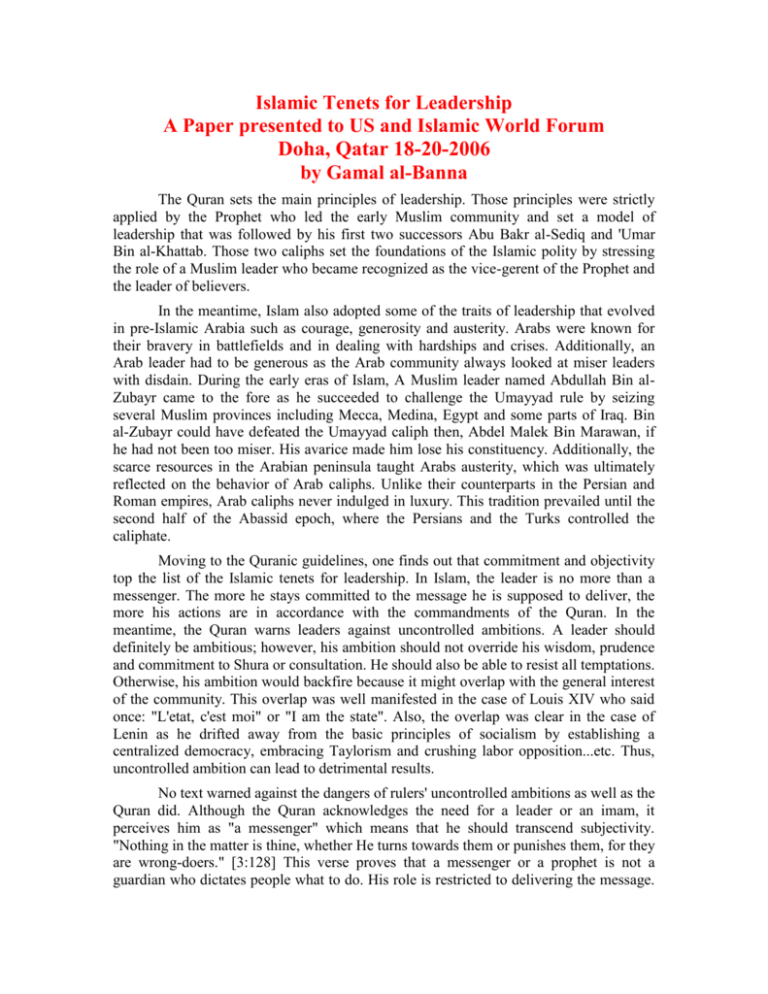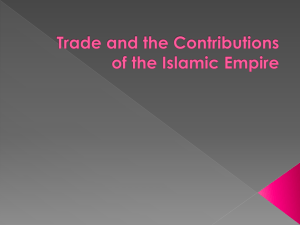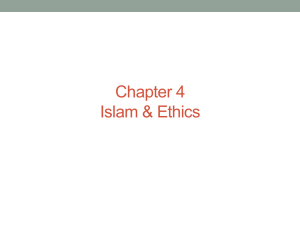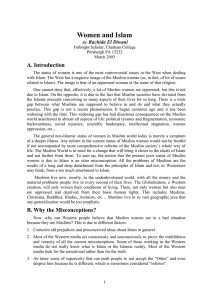Islamic Tenets for Leadership
advertisement

Islamic Tenets for Leadership A Paper presented to US and Islamic World Forum Doha, Qatar 18-20-2006 by Gamal al-Banna The Quran sets the main principles of leadership. Those principles were strictly applied by the Prophet who led the early Muslim community and set a model of leadership that was followed by his first two successors Abu Bakr al-Sediq and 'Umar Bin al-Khattab. Those two caliphs set the foundations of the Islamic polity by stressing the role of a Muslim leader who became recognized as the vice-gerent of the Prophet and the leader of believers. In the meantime, Islam also adopted some of the traits of leadership that evolved in pre-Islamic Arabia such as courage, generosity and austerity. Arabs were known for their bravery in battlefields and in dealing with hardships and crises. Additionally, an Arab leader had to be generous as the Arab community always looked at miser leaders with disdain. During the early eras of Islam, A Muslim leader named Abdullah Bin alZubayr came to the fore as he succeeded to challenge the Umayyad rule by seizing several Muslim provinces including Mecca, Medina, Egypt and some parts of Iraq. Bin al-Zubayr could have defeated the Umayyad caliph then, Abdel Malek Bin Marawan, if he had not been too miser. His avarice made him lose his constituency. Additionally, the scarce resources in the Arabian peninsula taught Arabs austerity, which was ultimately reflected on the behavior of Arab caliphs. Unlike their counterparts in the Persian and Roman empires, Arab caliphs never indulged in luxury. This tradition prevailed until the second half of the Abassid epoch, where the Persians and the Turks controlled the caliphate. Moving to the Quranic guidelines, one finds out that commitment and objectivity top the list of the Islamic tenets for leadership. In Islam, the leader is no more than a messenger. The more he stays committed to the message he is supposed to deliver, the more his actions are in accordance with the commandments of the Quran. In the meantime, the Quran warns leaders against uncontrolled ambitions. A leader should definitely be ambitious; however, his ambition should not override his wisdom, prudence and commitment to Shura or consultation. He should also be able to resist all temptations. Otherwise, his ambition would backfire because it might overlap with the general interest of the community. This overlap was well manifested in the case of Louis XIV who said once: "L'etat, c'est moi" or "I am the state". Also, the overlap was clear in the case of Lenin as he drifted away from the basic principles of socialism by establishing a centralized democracy, embracing Taylorism and crushing labor opposition...etc. Thus, uncontrolled ambition can lead to detrimental results. No text warned against the dangers of rulers' uncontrolled ambitions as well as the Quran did. Although the Quran acknowledges the need for a leader or an imam, it perceives him as "a messenger" which means that he should transcend subjectivity. "Nothing in the matter is thine, whether He turns towards them or punishes them, for they are wrong-doers." [3:128] This verse proves that a messenger or a prophet is not a guardian who dictates people what to do. His role is restricted to delivering the message. He has no right to force people to follow the right path. The Quran imposed those limitations on prophets and apostles, let alone ordinary leaders. There are also several prophetic traditions that stress the same point warning leaders against temptations and arrogance and commanding them not to live in isolation of their people. On the opposite, a leader's standard of living is supposed to be indiscernible from that of ordinary citizens. Those guidelines were strictly observed during the early eras of Islam, which prevented the rise of a privileged ruling aristocracy. Unfortunately, those guidelines were later relinquished when Muslims drifted away from the teachings of their religion and embraced the values of class civilizations. There are two highly important verses that contributed to shaping the role of a Muslim leader. Those verses stressed the Islamic concept of Shura or consultation of the Umma on public affairs. "And it is by some mercy of God that thou art gentle to them; hadst thou been harsh and hard of heart, they would have dispersed from about thee; so pardon them, and pray forgiveness for them, and take counsel with them in the affair; and when thou art resolved, put thy trust in God; surely God loves those who put their trust in Him." [3:159] "And those who answer their Lord, and establish the Prayer; and their affair is by counsel between them;" [42:38] The verse was revealed in the aftermath of Uhud battle which marked the defeat of the early Muslim army by pagans. Actually, Muslims were defeated because they disobeyed the prophets and left their positions to collect the booty before making sure they were victorious. This verse was revealed to pre-empt any attempt from the prophet to stop exercising the Shura in the wake of the battle. Actually, the best equivalence of the concept of Shura is 'democracy1. Unsurprisingly, the prophet's first two successors followed in his footsteps, each adding a new tenet to the Islamic concept of leadership. They established themselves as two of the greatest statesmen in the world. If we take al-Sediq's inaugural address after he was sworn in, we find out that he preached the basic tenets of democracy. He stressed that he was elected by people maintaining that he was not necessarily the best Muslim. He asked people to obey him if he is correct and to disobey him and correct him if he violates God's commandments. Moving to 'Umar, he stressed the same values in his inaugural address. He tolerated all aspects of opposition to his rule and proved to be an honest and austere ruler. Unfortunately, the values promoted by early Muslim leaders could have benefited all states in the world, had not the crusades masked them. In conclusion, I believe that Islam laid precious foundations for leadership. Both leaders and peoples should be held responsible for the negligence of those values. I believe leaders are in dire need for those values in all parts of world including the west which still needs to strike a balance between absolute freedom and commitment.











